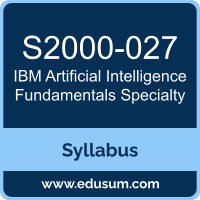 Use this quick start guide to collect all the information about IBM Artificial Intelligence Fundamentals Specialty (S2000-027) Certification exam. This study guide provides a list of objectives and resources that will help you prepare for items on the S2000-027 IBM Artificial Intelligence Fundamentals Specialty v1 exam. The Sample Questions will help you identify the type and difficulty level of the questions and the Practice Exams will make you familiar with the format and environment of an exam. You should refer this guide carefully before attempting your actual IBM Artificial Intelligence Fundamentals Specialty certification exam.
Use this quick start guide to collect all the information about IBM Artificial Intelligence Fundamentals Specialty (S2000-027) Certification exam. This study guide provides a list of objectives and resources that will help you prepare for items on the S2000-027 IBM Artificial Intelligence Fundamentals Specialty v1 exam. The Sample Questions will help you identify the type and difficulty level of the questions and the Practice Exams will make you familiar with the format and environment of an exam. You should refer this guide carefully before attempting your actual IBM Artificial Intelligence Fundamentals Specialty certification exam.
The IBM Artificial Intelligence Fundamentals Specialty certification is mainly targeted to those candidates who want to build their career in Data, Analytics, and AI domain. The IBM Artificial Intelligence Fundamentals Specialty v1 exam verifies that the candidate possesses the fundamental knowledge and proven skills in the area of IBM Artificial Intelligence Fundamentals Specialty.
IBM Artificial Intelligence Fundamentals Specialty Exam Summary:
| Exam Name | IBM Artificial Intelligence Fundamentals Specialty v1 |
| Exam Code | S2000-027 |
| Exam Price | $100 (USD) |
| Duration | 60 mins |
| Number of Questions | 44 |
| Passing Score | 70% |
| Schedule Exam | Pearson VUE |
| Sample Questions | IBM Artificial Intelligence Fundamentals Specialty Sample Questions |
| Practice Exam | IBM S2000-027 Certification Practice Exam |
IBM S2000-027 Exam Syllabus Topics:
| Topic | Details | Weights |
|---|---|---|
| Introduction to AI |
- Define Artificial Intelligence (AI) - Describe the history of AI - Define and describe machine learning - Differentiate between structured and unstructured data - Describe how machine learning structures data - Describe how AI uses probabilistic calculation to solve problems - Describe the fundamentals of machine learning |
16% |
| Natural Language Processing and Computer Vision |
- Define natural language processing (NLP) - Explain how AI uses natural language processing to derive meaning from text - Explain the classification problem and its solutions - Describe how conversational AI understands, reasons, learns, and interacts with users - Identify optimal use cases for conversational AI - Identify real-world uses for natural language processing (NLP) - Describe how AI classifies images and how a convolutional neural network(CNN) analyzes an image - Describe how a generative adversarial network (GAN) creates a credible image - Identify real-world uses for computer vision |
20% |
| Machine Learning and Deep Learning |
- Distinguish between artificial intelligence, machine learning, and deep learning - Describe supervised, unsupervised, and reinforcement learning - Describe decision trees, linear regression, and logistic regression - List and explain advantages of classical machine learning - Describe how neural networks are inspired by the human brain - Describe machine learnings trial-and-error learning process - Define and describe deep learning and its ecosystem - Identify real-world applications for the deep learning ecosystem - Identify future trends for machine learning - Describe machine learning algorithms and models - Describe how AutoAI builds models |
25% |
| AI Ethics, Security and Governance |
- Identify the five pillars of AI ethics - Describe protected attributes - Identify privileged groups and unprivileged groups - Describe adversarial robustness within AI - Explain how an adversary can influence an AI system - Identify adversarial attacks - Compare interpretability and explainability - Describe AI governance - Identify the business roles and the five pillars of trustworthy AI - Describe Personally Identifiable Information (PII) - Recognize model anonymization - Explain data minimization |
27% |
| AI Use Case Implementation |
- Identify which AI model is most suitable for a given use case scenario - Identify the optimal implementation strategy for generative AI - Identify the optimal implementation strategy for traditional AI |
12% |
To ensure success in IBM Artificial Intelligence Fundamentals Specialty certification exam, we recommend authorized training course, practice test and hands-on experience to prepare for IBM Artificial Intelligence Fundamentals Specialty v1 (S2000-027) exam.
